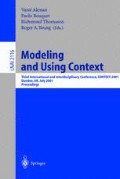Abstract
In a series of recent papers the economist Michael Bacharach [2] has pointed out that most approaches in knowledge representation suffer from two complementary defects. Typically they assume that agents know all the logical consequences of information encoded in a finite knowledge base (Cleverness) and only these consequences (Cloistered-ness). In this article we develop first-order and inductive extensions of Montague-Scott’s semantics in order to tackle both problems at once. Three desiderata are put forward for representing epistemic context: (1) expressive adequacy, (2) inductive power, (3) boundedness. An important part of our effort focuses on reconsidering the role of standard formalisms (both logical and probabilistic) in representing the information of bounded agents.
Access this chapter
Tax calculation will be finalised at checkout
Purchases are for personal use only
Preview
Unable to display preview. Download preview PDF.
References
Arló-Costa, H., First order extensions of classical systems of modal logic: the role of the Barcan schemas, forthcoming in Studia Logica.
M.O.L. Bacharach. ‘The epistemic structure of a theory of a game,’ in M.O.L. Bacharach, L.-A. Gérard-Varet, P. Mongin and H.S. Shin (eds.), Epistemic Logic and the theory of Games and Decisions, Boston, Dordrecht, London, 303–345, 1997.
B.F. Chellas. Modal logic: an introduction. Cambridge University Press, Cambridge, 1980.
H.E. Jr. Kyburg. Probability and the logic of rational belief Wesleyan University Press. Middletown, 1961.
H.E. Jr. Kyburg. ‘Probabilistic inference and non-monotonic inference,’ Uncertainty in Artificial Intelligence, R.D Schachter, T.S. Evitt, L.N. Kanal J.F. Lemmer (eds.), Elsevier Science (North Holland), 1990.
Isaac Levi. The Enterprise of Knowledge. The MIT Press, Cambridge, Massachusetts, 1980.
R. Montague. ‘Universal Grammar,’ Theoria 36, 373–98, 1970.
Robert Moore. Logic and Representation, CSLI Lecture Notes No. 39, 1995.
D. Scott ‘Advice in modal logic,’ K. Lambert (Ed.) Philosophical Problems in Logic Dordrecht, Netherlands: Reidel, 143–73, 1970.
Robert Stalnaker. ‘A note on non-monotonic modal logic,’ Artificial Intelligence 64, 183–196, 1993.
Ariel Rubinstein. Lectures on Modeling Bounded Rationality, Core Lecture Series, Louvain-La-Neuve, Universite Catholique de Louvain, reprinted by MIT Press (1998), 1996.
Author information
Authors and Affiliations
Editor information
Editors and Affiliations
Rights and permissions
Copyright information
© 2001 Springer-Verlag Berlin Heidelberg
About this paper
Cite this paper
Costa, H.A. (2001). Trade-Offs between Inductive Power and Logical Omniscience in Modeling Context. In: Akman, V., Bouquet, P., Thomason, R., Young, R. (eds) Modeling and Using Context. CONTEXT 2001. Lecture Notes in Computer Science(), vol 2116. Springer, Berlin, Heidelberg. https://doi.org/10.1007/3-540-44607-9_1
Download citation
DOI: https://doi.org/10.1007/3-540-44607-9_1
Published:
Publisher Name: Springer, Berlin, Heidelberg
Print ISBN: 978-3-540-42379-9
Online ISBN: 978-3-540-44607-1
eBook Packages: Springer Book Archive

